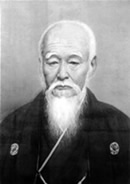On October 10, 1877, Chushu Mishima founded Nishogakusha, Chinese Classic Studies Academy. He was a prominent scholar of Chinese Classics Studies and had a great influence over the Japanese bar associations around that time when Japan was experiencing a tumultuous decade following the start of the Meiji Era, trying to absorb the Western culture.
Concerned about the situation of Japan at that time, he strongly advocated the importance of learning the Oriental cultures to find out the true direction of the country. His goal was to establish the system of the Oriental Studies and to develop capable human resources to lead the country to a new era.
In 1928, Nishogakusha Academy was established and gained a university status in 1949, when the Departments of Japanese Literature and Chinese Literature were created in the Faculty of Literature. The Graduate School of Literature was added in 1966 and the Faculty of International Political Science and Economics in 1991, aimed at fostering global citizens based on the philosophy of establishment of Nishogakusha.
Nishogakusha University was registered as a full membership university of the Japan University Accreditation Association (JUAA) in 1997 and celebrated the 130th anniversary on October 10, 2007. The long history and tradition together with the vision towards the future development of Nishogakusha University have been all built on Chushu’s vision for “Education and Scholarship.”

